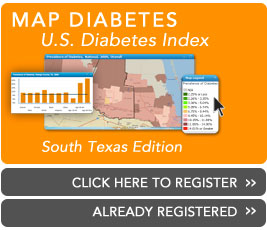Posted by Diabetes Rio Grande
Clinical Trials
Thursday, August 20th, 2015
Diabetes Care, March 2015
OBJECTIVE To compare pharmacokinetics (PK) and pharmacodynamics (PD) of insulin glargine in type 2 diabetes mellitus (T2DM) after evening versus morning administration.…
CONCLUSIONS The PD of insulin glargine differs depending on time of administration. With morning administration insulin activity is greater in the first 0–12 h, while with evening administration the activity is greater in the 12–24 h period following dosing. However, glargine PK and plasma C-peptide levels were similar, as well as glargine PD when analyzed by 24-h clock time independent of the time of administration. Thus, the results reflect the impact of circadian changes in insulin sensitivity in T2DM (lower in the night-early morning vs. afternoon hours) rather than glargine per se. Read more.
Posted by Diabetes Rio Grande
Clinical Trials
Thursday, August 20th, 2015
Diabetes Care, 17 June 2015
OBJECTIVE To evaluate the impact of exercise training (ET) on metabolic parameters among participants with type 2 diabetes mellitus (T2DM) who do not improve their cardiorespiratory fitness (CRF) with training.…
CONCLUSIONS ET is associated with significant improvements in metabolic parameters irrespective of improvement in cardiorespiratory fitness. Read more.
Posted by Diabetes Rio Grande
Clinical Trials
Thursday, August 20th, 2015
Diabetes Care, 9 September 2014
OBJECTIVE To assess the efficacy/safety of canagliflozin, a sodium–glucose cotransporter 2 inhibitor, compared with glimepiride over 104 weeks in patients with type 2 diabetes inadequately controlled with metformin.…
CONCLUSIONS Canagliflozin provided durable glycemic improvements compared with glimepiride and was generally well tolerated in patients with type 2 diabetes receiving background treatment with metformin over 104 weeks. Read more.
Posted by Staff
Clinical Trials
Thursday, August 7th, 2014
PLOS: August 04, 2014
Background
Incretin–based therapies which include glucagon-like peptide-1 (GLP-1) receptor agonists and dipeptidyl peptidase-4 (DPP-4) inhibitors are recommended by several practice guidelines as second-line agents for add-on therapy to metformin in patients with type 2 diabetes (T2DM) who do not achieve glycemic control with metformin plus lifestyle interventions alone. The purpose of this study is to perform a systematic review with meta-analysis of existing head to head studies to compare the efficacy and safety of GLP-1 analogues with DPP-4 inhibitors. Read More
Posted by Staff
Clinical Trials
Thursday, August 7th, 2014
PLOS: July 30, 2014
Background
Tree nut consumption has been associated with reduced diabetes risk, however, results from randomized trials on glycemic control have been inconsistent.
Objective
To provide better evidence for diabetes guidelines development, we conducted a systematic review and meta-analysis of randomized controlled trials to assess the effects of tree nuts on markers of glycemic control in individuals with diabetes. Read More
Posted by Staff
Clinical Trials
Thursday, August 7th, 2014
Diabetes Care July 30, 2014
OBJECTIVE To compare the efficacy and safety of new insulin glargine 300 units/mL (Gla-300) with glargine 100 units/mL (Gla-100) in people with type 2 diabetes on basal insulin (≥42 units/day) plus mealtime insulin.
RESEARCH DESIGN AND METHODS EDITION 1 (NCT01499082) was a 6-month, multinational, open-label, parallel-group study. Adults with glycated hemoglobin A1c (HbA1c) 7.0–10.0% (53–86 mmol/mol) were randomized to Gla-300 or Gla-100 once daily with dose titration seeking fasting plasma glucose 4.4–5.6 mmol/L. Primary end point was HbA1c change from baseline; main secondary end point was percentage of participants with one or more confirmed (≤3.9 mmol/L) or severe nocturnal hypoglycemia from week 9 to month 6. Read more
Posted by Staff
Clinical Trials
Thursday, August 7th, 2014
Diabetes July 28, 2014
Gut-derived hormones, such as glucagon-like peptide-1 (GLP-1), have been proposed to relay information to the brain to regulate appetite. GLP-1 receptor agonists, currently used for the treatment of type 2 diabetes (T2DM), improve glycemic control and stimulate satiety leading to decreases in food intake and bodyweight. We hypothesized that food intake reduction following GLP-1 receptor activation is mediated through appetite- and reward-related brain areas. Obese T2DM patients, normoglycemic obese and lean individuals (n=48) were studied in a randomized, crossover, placebo-controlled trial. Using functional MRI we determined the acute effects of intravenous administration of the GLP-1 receptor agonist exenatide, with or without prior GLP-1 receptor blockade using exendin9-39, on brain responses to food pictures, during a somatostatin pancreatic-pituitary clamp. Obese T2DM patients and normoglycemic obese vs. lean subjects showed increased brain responses to food pictures in appetite- and reward-related brain regions (insula and amygdala). Read More



























